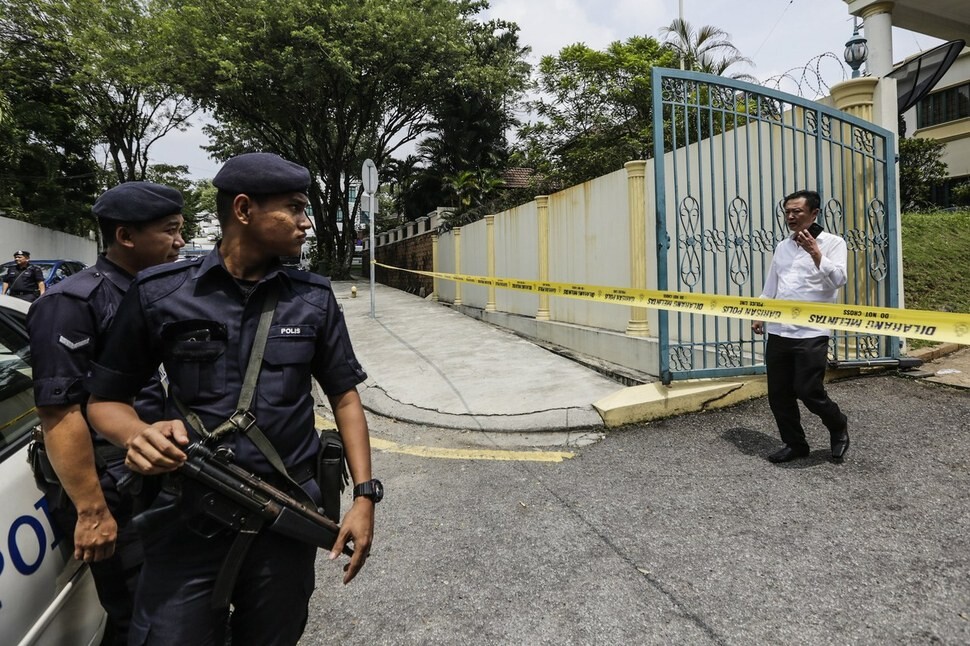hankyoreh
Links to other country sites 다른 나라 사이트 링크
North Korea and Malaysia enact exit bans on each others’ citizens

Malaysia responded to Pyongyang’s ban on Malaysians leaving North Korea with its own ban on North Koreans leaving Malaysia.
The measure suggests a growing possibility the two sides’ frictions in the wake of the assassination of Kim Jong-un’s half-brother Jong-nam, 46, could escalate into a break in diplomatic relations.
In a Mar. 7 report, North Korea’s Korean Central News Agency said, “The Bureau of Protocol of the Democratic People’s Republic of Korea Ministry of Foreign Affairs notified the Malaysian embassy at that institution’s request that Malaysian nationals within North Korean territory are temporarily not permitted from leaving.”
The agency went on to say the exit ban would last “until the incident that occurred in Malaysia is resolved fairly and thorough guarantees are made on the safety of North Korean diplomats and citizens in Malaysia.”
The Malaysian Foreign Ministry said a total of 11 Malaysian nationals were in North Korea, including three diplomats and their family members.
Soon after the announcement, Malaysia instituted its own exit ban on North Korean nationals.
“I have . . . instructed the Inspector-General of Police to prevent all North Korean citizens in Malaysia from leaving the country until we are assured of the safety and security of all Malaysians in North Korea,” Prime Minister Najib Razak was quoted as saying in a report by local news outlet The Star.
Najib also urged Pyongyang to immediately lift its exit ban on Malaysian nationals in North Korea.
“This abhorrent act, effectively holding our citizens hostage, is in total disregard of all international law and diplomatic norms,” he said.
Najib warned that Malaysia may take additional measures if North Korea does not lift the ban. Malaysia also convened an emergency meeting of its National Security Council to discuss response measures. Around 1,000 North Korean nationals are estimated to be in Malaysia at present.
As relations between Pyongyang and Kuala Lumpur continue to sour, the two sides could eventually close their embassies, withdraw diplomatic personnel, and even sever relations.
After Kim Jong-nam was killed on Feb. 13 at Kuala Lumpur International Airport, North Korea demanded that Malaysia turn over his corpse, claiming it could not trust the investigation by Malaysian police. Malaysia refused the request. It also voided a visa waiver agreement with North Korea; on Mar. 6, it expelled North Korean ambassador Kang Chol. Pyongyang issued its own deportation order for the local Malaysian ambassador in response.
Malaysian police believe two suspects in Kim’s slaying, 44-year-old second class North Korean embassy secretary Hyon Kwang-song and 37-year-old Air Koryo employee Kim Wook-il, are currently in hiding at the North Korean embassy in Kuala Lumpur. Following the exit ban order for North Korean nationals, 15 Malaysian police with machine guns surrounded the North Korean embassy.
“If it takes five years, we will wait outside [the embassy for the suspects],” said Malaysian police chief Khalid Abu Bakar.
By Jung In-hwan and Hwang Keum-bi, staff reporters
Please direct questions or comments to [english@hani.co.kr]

Editorial・opinion
![[Column] Park Geun-hye déjà vu in Yoon Suk-yeol [Column] Park Geun-hye déjà vu in Yoon Suk-yeol](https://flexible.img.hani.co.kr/flexible/normal/500/300/imgdb/original/2024/0424/651713945113788.jpg) [Column] Park Geun-hye déjà vu in Yoon Suk-yeol
[Column] Park Geun-hye déjà vu in Yoon Suk-yeol![[Editorial] New weight of N. Korea’s nuclear threats makes dialogue all the more urgent [Editorial] New weight of N. Korea’s nuclear threats makes dialogue all the more urgent](https://flexible.img.hani.co.kr/flexible/normal/500/300/imgdb/original/2024/0424/7317139454662664.jpg) [Editorial] New weight of N. Korea’s nuclear threats makes dialogue all the more urgent
[Editorial] New weight of N. Korea’s nuclear threats makes dialogue all the more urgent- [Guest essay] The real reason Korea’s new right wants to dub Rhee a founding father
- [Column] ‘Choson’: Is it time we start referring to N. Korea in its own terms?
- [Editorial] Japan’s rewriting of history with Korea has gone too far
- [Column] The president’s questionable capacity for dialogue
- [Column] Are chaebol firms just pizza pies for families to divvy up as they please?
- [Column] Has Korea, too, crossed the Rubicon on China?
- [Correspondent’s column] In Japan’s alliance with US, echoes of its past alliances with UK
- [Editorial] Does Yoon think the Korean public is wrong?
Most viewed articles
- 1‘We must say no’: Seoul defense chief on Korean, USFK involvement in hypothetical Taiwan crisis
- 2N. Korean delegation’s trip to Iran shows how Pyongyang is leveraging ties with Moscow
- 3‘Weddingflation’ breaks the bank for Korean couples-to-be
- 4[Column] Park Geun-hye déjà vu in Yoon Suk-yeol
- 5Korea sees more deaths than births for 52nd consecutive month in February
- 6[Guest essay] The real reason Korea’s new right wants to dub Rhee a founding father
- 7[Column] The clock is ticking for Korea’s first lady
- 8[Column] Has Korea, too, crossed the Rubicon on China?
- 9Why Korea shouldn’t welcome Japan’s newly beefed up defense cooperation with US
- 10Will NewJeans end up collateral damage in internal feud at K-pop juggernaut Hybe?